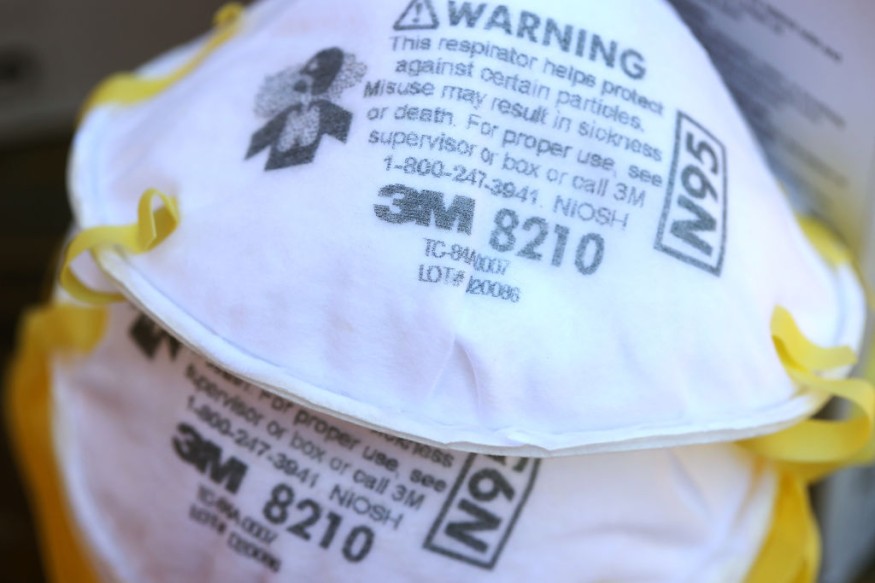Some experts urge the public to upgrade cloth and surgical masks to N95 masks that are much more protective, although a shortage of supplies remains a concern.
A ScienceAlert report said, along with the enhanced virulence of the new COVID-19 Omicron variant, the limited supply is why the recommendation has thus far been held back, although new research may make this more plausible suggesting N95s can be safely decontaminated several times in a clinical background.
Researchers of the study investigated if the said respirators deteriorate following decontamination, a process in which the mask gets exposed to ultraviolet light or vaporized hydrogen peroxide or VHP, as detailed in Biomedical Instrumentation & Technology, to destroy any SARS-CoV-2 virus particles that possibly struck around.
While early in this pandemic study specified that an N95 could be decontaminated and reused a few times minus being compromised, new research from a team at Beth Israel Deaconess Medical Center in Boston has now exhibited that even after 25 cycles of VHP decontamination, the N95 respirator was only as good at fitting on the face, as well as filtrating particles.

Use of N95 Respirators
Essentially, N95 respirators are face-covering fitted very closely to the face to make a seal. To be classified as an N95 respirator, the shielding device needs to meet the United States National Institute for Occupational Safety and Health N95 classification of air filtration. Meaning it filters approximately 95 percent of airborne particles.
In their study published in the American Journal of Infection Control, the researchers specified that most VPH studies were limited to examining documentation efficiency, respirator filtration after five to 10 cycles, "or fit on mannequins."
They added, they were seeking to determine if repeated VFP reprocessing would impact N95 respiratory integrity as described by qualitative and quantitative fit and filtration effectiveness over 25 processing rounds.
From June to August in 2020, the study authors examined seven volunteers using N95 masks, specifically 3M 1860/1860S N95 respirators.
Each participant has fitted a properly sized mask, also known as "fit testing," and then the researchers used VHP to decontaminate the respirators after use.
Decontaminating with Hydrogen Peroxide for 25 Decontamination Cycles
After the hydrogen peroxide had broken down, the researchers returned the N95 respirators to the study participants, who were then asked to perform a "user seal check."
Then, they did this for 25 decontamination cycles, along with a user seal check following each cycle. Every few rounds, a quantitative fit test was carried out.
This was where specialized equipment checks the air leaking through the seal. For every five cycles, a filtration effectiveness testing and a qualitative fit test, a test where the mask fails if the participant can smell or taste anything while the mask is worn, was carried out. Following 25 decontamination rounds, the researchers did not find any changes from before the first round until the end.
The masks might have lasted even longer, but the researchers stopped at 25 since a Food and Drug Administration report has already found that by the 35th cycle, the straps began to degrade.
Unfortunately, most people do not have access to a specialized sterilization chamber for conducting VHP. Nevertheless, all hope is not gone as there are other ways of sterilizing an N95 mask at home.
Efficacy of Dry Heat
Another recently-conducted research published in PLOS One showed that dry heat such as the one existing in an oven could also work.
At 100 degrees Celsius, 30 minutes was adequate to destroy SARS-CoV-2 virus particles, although not damaging the face mask.
Specifically, the research team used a walk-in oven, instead of the standard one, with just four types of respirators usually worn by health care frontliners, and thus, the results may vary.
They approached as well, only once. Therefore, heat decontamination may not be as long-lasting as the decontamination with VHP, although more extensively available.
Report about the N95 masks' decontamination and reusability is shown on KENS 5's YouTube video below:
RELATED ARTICLE : Mask Said To Deactivate Different Coronavirus Types in 2 Hours
Check out more news and information on COVID-19 and Face Masks on Science Times.
© 2026 ScienceTimes.com All rights reserved. Do not reproduce without permission. The window to the world of Science Times.












